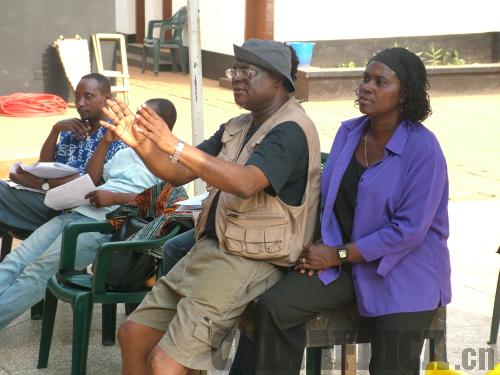|
 |
|
ACTION: Femi Osofisan directs his drama in Ghana |
Geographically and culturally, there may seem to be a huge distance between China and Africa. But in Femi Osofisan's opinion, the two also share many similarities. Both can identify with a feudal, aristocratic past, the fight for political institutions, and the problems inherent in rapid modernization.
Osofisan, a Nigerian writer, is well known in African theater circles. A drama professor at the University of Ibadan, he has written more than 50 plays – many ranked among Nigeria's most famous dramatic works. His plays focus on social realities. He is also an actor, director and theatrical company leader.
Last June, Osofisan was invited to Peking University to guest-lecture for three weeks. In the past, he has taught at other universities in the United States, Europe and Asia, where his plays have been studied and produced. China, for him, is another window of exploration and collaboration. Introducing African literature to his Chinese students, he feels he is able to touch the footprints of an ancient civilization running toward modernity.
"I am hoping that I will be able to create a play, or a book of poems," Osofisan says of the experience. "[It] will reflect our common concerns as Chinese and Africans, but [also] essentially as human beings caught in the drama of the new millennium."
A collaboration
Cheng Ying is a postgraduate student majoring in African literature at Peking University. She worked as Osofisan's interpreter during his stay in China. Given her close contact with the writer, she has developed a deep understanding of his works.
"His works can definitely be taken as a reference for Chinese modern drama," she says. Chen believes that African literature is grounded in realism, and Osofisan's plays interweave experiences with imagination to illustrate dilemmas of modern life. From his lectures, which are based on his years as a playwright and director, students can gain a better comprehension of African theater.
On the other hand, communicating with Chinese students, scholars and writers also helps Osofisan understand China better. He calls his trip to China a collaboration: "I say collaboration because I myself will be seizing the opportunity, through these students, to learn about China and its culture."
Besides giving lectures, Osofisan also visited historic sites in Beijing. Beautiful vistas caused him to sing ballads in Yoruba, to the delight of the people around him. And wahen he left China, he left with a pile of books on Chinese culture and literature.
Encore
According to Wei Liming, director of the Department of African and Asian Languages at Peking University, Osofisan's June trip is just the beginning.
The university also plans to invite him for a three-year stint to conduct research on African literature in China and to introduce African literature to students. They hope this can promote African literature research in the university as well as across the country.
"I believe that this is a wonderful opportunity for intercultural exchange," says Osofisan, expressing his appreciation for the invitation.
Osofisan is not a familiar name with China's mainstream readers, but its academic circles are taking notice. Famous Chinese writer Liu Zhenyun has become his friend, and many scholars are researching his dramas. Most notably, Yu Zhongxian, the chief editor at World Literature, has gone on the record saying his magazine will translate the playwright's Esu and the Vagabond Minstrels. Osofisan may have his Chinese readers yet. |